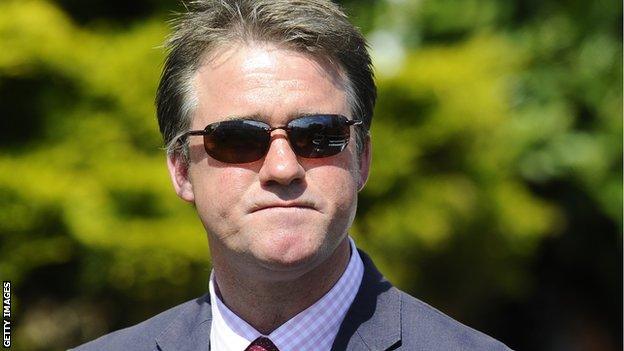Gerard Butler: Trainer given five-year racing ban over doping
- Published

Trainer Gerard Butler has been banned from racing for five years after nine horses in his care tested positive for a banned anabolic steroid.
Butler, 47, admitted at a British Horseracing Authority inquiry to seven charges relating to injecting horses.
He injected four horses with Rexogin, which contains stanozolol, and is designed for use in humans.
It was "an appalling breach of his duty to look after the interests of the horses in his care," said the BHA.
He is the second Newmarket trainer, after the steroids scandal which saw Godolphin trainer Mahmood Al Zarooni banned for eight years in April, to be given a long suspension this year.
Butler, who spent his early career with top trainers including D Wayne Lukas, Colin Hayes and John Dunlop and has operated in his own right for 15 years, must disperse his string of horses by Friday.
The BHA's disciplinary panel heard that he administered the banned substance Rexogin using a method of injection only qualified veterinary surgeons are allowed to use.
Irishman Butler had previously claimed all his horses had been given a weaker equine steroid called Sungate, which is a treatment for joint pain.
But the Newmarket trainer admitted at the hearing that he injected Rexogin, which is 10 times more concentrated, into the fetlock and knee joints of Azrag, Zain Eagle, Zain Spirit, Prince Alzain.
He also failed to record his action in the horses' medical records and let vets treat the horses without informing them of the injections.
Butler bought five boxes of Rexogin, used by human bodybuilders, from UK Steroids Pharmacy on the internet.
He paid for the drugs out of his own pocket and did not mark their purchase down on the yard's accounts.
The trainer claimed this was because he felt the horses' owner would not pay for the treatment.
In its ruling, the panel said: "Butler's behaviour in administering the injections was consistent with the underhand and covert manner in which he purchased the drug."
Butler also admitted a charge of failing to keep a record of treatment.
He believed the vet from Rossdales Equine Hospital, who administered the Sungate, would write down the treatment in the yard's medication book.
But he was unable to do so because the book was kept in a locked office.
"Butler's evidence revealed an appalling dereliction of his duty as a licensed trainer," the panel added.
"By his own admission, Butler kept no clear financial records or any invoice from the purchase of the Rexogin, he did not have the horses properly assessed prior to their treatment and made no recording in his medication records having injected the horses.
"He used junior stable staff to help him who would not question his actions and deceived his senior stable staff and kept from them important information about the treatment given to the horses."
The BHA's director of integrity Adam Brickell has questioned why vets were recommending Sungate to trainers and suggested the Royal College of Veterinary Surgeons should take an interest.
A BHA investigation earlier this year, triggered by Butler's claim that more than 100 horses had been been given the drug, produced evidence that 43 animals had received Sungate despite anabolic steroids being banned in British racing.
Brickell said: "It remains of concern to BHA that a practising vet regularly treating racehorses, and therefore presumably familiar with the rules, should have recommended and administered such a product to a horse in a trainer's care or control.
"This is an area we are continuing to explore and consult on with a view to strengthening our position.
"If the Royal College of Veterinary Surgeons chooses to follow up on this specific matter we would assist as required, as we have done on previous occasions."
Butler's biggest win was training Compton Admiral to victory in the 1999 Eclipse Stakes at Sandown.
.
- Published7 August 2013
- Published19 November 2013
- Published7 June 2013
- Published25 April 2013